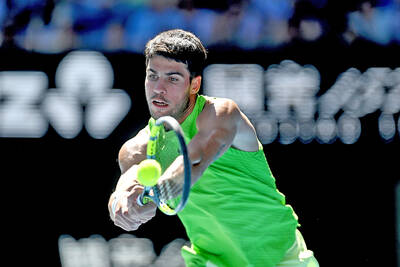The London Olympics are not big business for everyone — sex workers say they are being cleared from the streets around the stadium to make the area more presentable for the Games.
While the UK’s limp economy hopes for an Olympic boost, police in Newham, the deprived east London borough that is home to the stadium, have closed about 80 brothels in the 18 months to March, a study by a local councilor shows.
“For the last two years we’ve seen a real increase in police activity in relation to sex work in the Olympic host boroughs,” said Georgina Perry, who runs Open Doors, a government project supporting east London prostitutes.
“Some of the women who sell sex have experienced so many brothel closures that they are now working on the street, and that is a much less safe place,” she said.
The expected influx of 2 million visitors for the Olympics has led British Prime Minister David Cameron to predict a £13 billion (US$20.2 billion) boost for the economy over the next four years.
However, the sex trade looks likely to miss out on any benefits, campaigners say.
Prostitution is legal in the UK, but keeping a brothel is outlawed, as are other related activities such as curb-crawling.
London’s Metropolitan Police have denied that the brothel raids were connected to the Olympics, saying they were “in response to community concerns.”
“Any police activity regarding prostitution has been undertaken as part of normal policing responsibilities,” a police spokeswoman said.
However, London Mayor Boris Johnson openly supports a crackdown on the sex trade ahead of the Olympics.
“We are determined to crack down on prostitution and human trafficking in the run up to the London 2012 Games,” a statement on his Web site reads.
Scotland Yard said it was unable to specify the number of east London brothels that have been raided and sex workers arrested in the run-up to the Olympics.
Yet charities working with local prostitutes, many of whom are migrants from Brazil and eastern Europe, have reported a spike in the number arrested.
Critics say the crackdown does little to stamp out the sex trade — it simply shifts it around the city, putting sex workers in danger.
Perry said brothel raids have forced prostitutes to confront the dangers of approaching strangers in cars, while clearing them from familiar areas disconnects them from services like Open Doors.
“They are already stigmatized, they are already vulnerable,” Perry said. “All that’s happening to them is that they’re moving further away from services that can support them.”
Still, not everyone is so unhappy about the crackdown.
Brick Lane, a stretch of curry restaurants that is home to London’s Bangladeshi community, lies just 7km from the Olympic Park.
“This area is a haven for drugs, prostitution and all the other crimes you can think of,” mother-of-three Lily Islam said, standing in the middle of her housing estate just off the famous street.
In the last few months, Islam has led a successful campaign to force police to keep prostitutes away from the estate, which its overwhelmingly Muslim residents say has been blighted by the sex trade for decades.
Like Perry, she is worries about the safety of sex workers, but said she and her friends were sick of walking their children through an estate littered with used condoms.
She suspects that the Games are part of the reason her local police have been so keen to help.
“I think with the Olympics coming, it’s highlighted the problem a bit more,” she said.
Scotland Yard has said there is no evidence that prostitution has risen in east London.
In fact, one sex worker said that her colleagues are bracing for a sharp fall in business.
“It’s a family event — it’s not like all the visitors are going to be single men,” Catherine Stephens said.
“It’s going to be a complete nightmare, and I think we’re all going to lose masses of money,” said Stephens, who has worked in brothels for more than a decade.
“I don’t think we’re going to see the clientele we normally see, because it’s going to be so difficult to get around,” she added.

The Philadelphia 76ers, fueled by 36 points from Tyrese Maxey and a triple-double from Joel Embiid, on Thursday beat the Houston Rockets 128-122 in an NBA overtime thriller. Cameroonian big man Embiid scored 32 points, grabbed 15 rebounds and handed out 10 assists, posting the ninth triple-double of his career to help the Sixers end the Rockets’ three-game winning streak. Rockets star Kevin Durant scored 36 points and Amen Thompson added 17, but Thompson was scoreless in the fourth quarter. Even so, the Rockets led by nine midway through the final frame, Maxey tying it at 115-115 with 40.1 seconds left. Durant missed a

The Milwaukee Bucks’ Giannis Antetokounmpo on Friday said that he will probably be out for an extended period after hurting his right calf again after a similar injury caused him to miss eight games earlier this season. Antetokounmpo had his right calf wrapped in the first half of their 102-100 loss to the Denver Nuggets. He did not appear comfortable the rest of the night and left for good with 34 seconds remaining. “At the end, I could not move no more, so I had to stop playing,” Antetokounmpo said. The two-time NBA Most Valuable Player said he expected to undergo an MRI

Taiwanese FORTUNES: Wu Fang-hsien and Hsieh Su-wei both advanced to the last 16 of the women’s doubles, but Ray Ho was ousted in the men’s doubles Carlos Alcaraz yesterday stepped up his quest to win a maiden Australian Open as he overwhelmed showman Corentin Moutet to reach the last 16, while Taiwan’s Wu Fang-hsien and Hsieh Su-wei both advanced to the last 16 of the women’s doubles. Three-time finalist Daniil Medvedev battled through on day six at a warm and sunny Melbourne Park, as did Coco Gauff. Top seed Alcaraz was never in danger against French 32nd seed Moutet, easing through 6-2, 6-4, 6-1 at Rod Laver Arena in 2 hours, 5 minutes. It was the Spaniard’s 100th Grand Slam match and he boasts a remarkable 87-13 win-loss record,

LICENSE TO THRILL: Fans of Learner Tien, the youngest man to reach the quarter-finals in 11 years, wore ‘L Plates,’ signs for learning drivers, in support of the 20-year-old Taiwan’s Wu Fang-hsien and Japanese partner Eri Hozumi yesterday dominated eighth seeds Ellen Perez of Australia and the Netherlands’ Demi Schuurs to advance to the Australian Open quarter-finals, the furthest the Taiwanese has made it since her first appearance in Melbourne in 2020. Wu and Hozumi overpowered world No. 21 Perez and world No. 20 Schuurs 6-2, 6-2 in 1 hour, 11 minutes at 1573 Arena in much cooled temperatures since Saturday’s blazing 40°C disrupted play. World No. 34 Wu has now made it further in the Australian Open since she was knocked out in the third round in 2024. The Taiwanese-Japanese duo